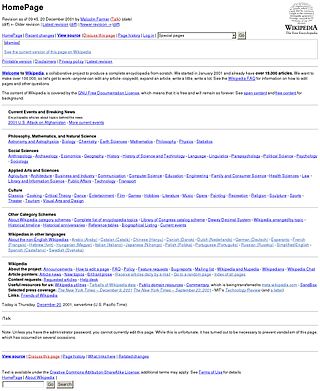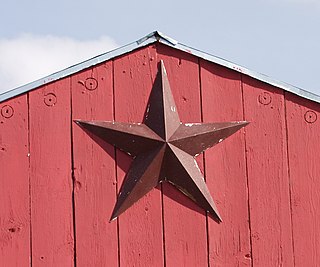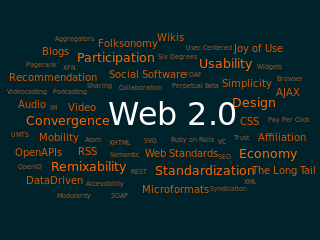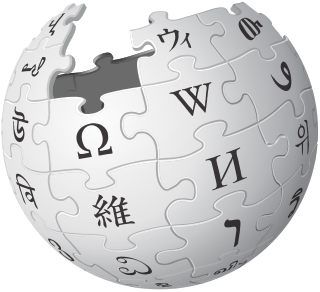
Wikipedia, a free-content online encyclopedia written and maintained by a community of volunteers known as Wikipedians, began with its first edit on 15 January 2001, two days after the domain was registered. It grew out of Nupedia, a more structured free encyclopedia, as a way to allow easier and faster drafting of articles and translations.

MeatballWiki is a wiki dedicated to online communities, network culture, and hypermedia. Containing a record of experience on running wikis, it is intended for "discussion about wiki philosophy, wiki culture, instructions and observations."

RPGnet is a role-playing game website. It includes sections on wargames, tabletop games and video games, as well as columns on gaming topics.

A barnstar is a painted object or image, often in the shape of a five-pointed star but occasionally in a circular "wagon wheel" style, used to decorate a barn in some parts of the United States. They have no structural purpose but may be considered lucky, akin to a horseshoe mounted over a doorway. They are especially common in Pennsylvania and frequently seen in German-American farming communities. They are also found in Canada, particularly in the province of Ontario.

Web 2.0 refers to websites that emphasize user-generated content, ease of use, participatory culture and interoperability for end users.
Mass collaboration is a form of collective action that occurs when large numbers of people work independently on a single project, often modular in its nature. Such projects typically take place on the internet using social software and computer-supported collaboration tools such as wiki technologies, which provide a potentially infinite hypertextual substrate within which the collaboration may be situated. Open source software such as Linux was developed via mass collaboration.

The free online encyclopedia Wikipedia has been criticized since its creation in 2001. Most of the criticism has been directed toward its content, community of established volunteer users, process, and rules. Critics have questioned its factual reliability, the readability and organization of its articles, the lack of methodical fact-checking, and its political bias. Concerns have also been raised about systemic bias along gender, racial, political, corporate, institutional, and national lines. Conflicts of interest arising from corporate campaigns to influence content have also been highlighted. Further concerns include the vandalism and partisanship facilitated by anonymous editing, clique behavior, social stratification between a guardian class and newer users, excessive rule-making, edit warring, and uneven policy application.

Intellipedia is an online system for collaborative data sharing used by the United States Intelligence Community (IC). It was established as a pilot project in late 2005 and formally announced in April 2006. Intellipedia consists of three wikis running on the separate JWICS (Intellipedia-TS), SIPRNet (Intellipedia-S), and DNI-U (Intellipedia-U) networks. The levels of classification allowed for information on the three wikis are Top Secret Sensitive Compartmented Information, Secret (S), and Sensitive But Unclassified information, respectively. Each of the wikis is used by individuals with appropriate clearances from the 18 agencies of the US intelligence community and other national-security related organizations, including Combatant Commands and other federal departments. The wikis are not open to the public.

The Essjay controversy was an incident in which Ryan Jordan, a Wikipedia editor who went by the username "Essjay", falsely presented himself as a university professor of religion from 2005 to 2007, during which time he was elected to top positions of trust by the community, including administrator and arbitrator. In July 2006, The New Yorker published an article about "Essjay", and mentioned that he was a university professor of religion. The New Yorker later acknowledged that they did not know his real name.

The history of wikis began in 1994, when Ward Cunningham gave the name "WikiWikiWeb" to the knowledge base, which ran on his company's website at c2.com, and the wiki software that powered it. The wiki went public in March 1995, the date used in anniversary celebrations of the wiki's origins. c2.com is thus the first true wiki, or a website with pages and links that can be easily edited via the browser, with a reliable version history for each page. He chose "WikiWikiWeb" as the name based on his memories of the "Wiki Wiki Shuttle" at Honolulu International Airport, and because "wiki" is the Hawaiian word for "quick".
Wikipedia has been studied extensively. Between 2001 and 2010, researchers published at least 1,746 peer-reviewed articles about the online encyclopedia. Such studies are greatly facilitated by the fact that Wikipedia's database can be downloaded without help from the site owner.

GroupLens Research is a human–computer interaction research lab in the Department of Computer Science and Engineering at the University of Minnesota, Twin Cities specializing in recommender systems and online communities. GroupLens also works with mobile and ubiquitous technologies, digital libraries, and local geographic information systems.

Wikiversity is a Wikimedia Foundation project that supports learning communities, their learning materials, and resulting activities. It differs from Wikipedia in that it offers tutorials and other materials for the fostering of learning, rather than an encyclopedia. It is available in many languages.

Whiskey Media was an American online media company founded independently by CNET co-founder Shelby Bonnie in 2008. It was the parent company of Tested, Screened, and Anime Vice, and the former parent company of Giant Bomb and Comic Vine. Whiskey Media websites were wiki community based, while maintaining an editorial staff. The company's target demographic was focused primarily on males between 10 and 30. The name "Whiskey Media" is a reference to a Kentucky distillery that was owned by the family of Shelby Bonnie before prohibition. Whiskey Media operated in San Francisco, California, after previously being located in Sausalito. On March 15, 2012, Whiskey Media was acquired by Lloyd Braun and Gail Berman's BermanBraun along with Tested, Screened, and Anime Vice while Giant Bomb and Comic Vine were bought separately by CBS Interactive.

The Wikipedia community, collectively and individually known as Wikipedians, is an online community of volunteers who create and maintain Wikipedia, an online encyclopedia. Since August 2012, the word "Wikipedian" has been an Oxford Dictionary entry.
Ed Huai-Hsin Chi is a Taiwanese American computer scientist and research scientist at Google, known for his early work in applying the theory of information scent to predict usability of websites.

The following outline is provided as an overview of and a topical guide to Wikipedia:

Aaron Halfaker is a principal applied scientist at Microsoft Research. He previously served as a research scientist at the Wikimedia Foundation until 2020.
A WikiProject, or Wikiproject, is an affinity group for contributors with shared goals within the Wikimedia movement. WikiProjects are prevalent within the largest wiki, Wikipedia, and exist to varying degrees within sibling projects such as Wiktionary, Wikiquote, Wikidata, and Wikisource. They also exist in different languages, and translation of articles is a form of their collaboration.

Volunteer editors of Wikipedia delete articles from the online encyclopedia regularly, following processes that have been formulated by the site's community over time. The most common route is the outright deletion of articles that clearly violate the rules of the website. Other mechanisms include an intermediate collaborative process that bypasses a complete discussion, and a whole debate at the dedicated forum called Articles for deletion (AfD). As a technical action, deletion can only be done by a subset of editors assigned particular specialized privileges by the community, called administrators. An omission that has been carried out can be contested by appeal to the deleting administrator or on another discussion board called Deletion review (DRV).















